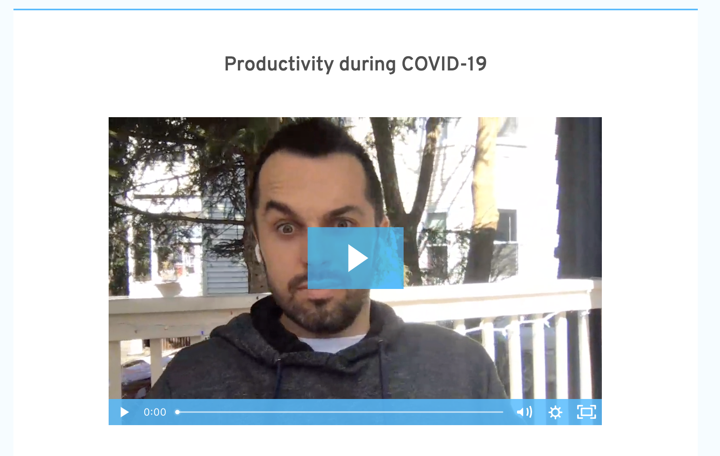COVID-19 has every organization under a whole new type of stress. With a swift migration to remote work, organizations need to adapt to ensure their teams are set up for success, and this is in addition to the already-busy people ops team’s daily work.
On top of this “new normal” that we’re trying to navigate, the stark reality for us is that our team members lives’ have been completely upended. Sure, we must try to figure out how to manage our teams, but the real goal of right now is how we can best support our team members and whatever they have going on in their lives.
Below are some ideas to support and connect with your team members during this significant moment in history:
1. Acknowledge, accept, and communicate the importance of balance between structure, support, and space
As Mel Larsen of Clubhouse said, “First and foremost, it is about humanity supporting each other through this seismic change.”
Chris Savage, the CEO of Wistia does a wonderful job emphasizing a people-first tone in his “Productivity during COVID19” video to the company. In it, he says:
“We just want to be super clear, we just want you to care of your family and to take care of yourselves. The work will be here, we’ll figure it out. Don’t worry. This is a rare moment in our lives and we want to look back on this moment and feel like we took care of each other, we took care of ourselves, we took care of our families, we took care of our customers, and we took care of our community. That is what is most important.”

As your team deals with new challenges that COVID-19 has caused in their work and personal lives, they will appreciate extra thought and ideas to build in online connection at work. But they'll also appreciate space and flexibility as they digest these huge global changes. People are holding grief and anxiety - and for good reason. Business goals will be changing, job responsibilities may adjust as teams cover for each other, and we'll all be grappling with high levels of uncertainty in our lives at and outside of work. Giving your team as much reassurance as possible that the company will provide space and flexibility as we all learn to cope with life in a pandemic will be just as important as providing the structure of new culture ideas that will keep us connected.
And as Brett Starr, from The Starr Conspiracy said, “When this is all over (and it will be over) people are going to remember how we behaved.”
2. Create a special COVID19 Slack channel
A COVID-19 Slack channel could be used to communicate your company's updates, as well as a place for people to keep up-to-date on all culture initiatives which are shifting to virtual. It can also be a place for people to share what they're doing to preserve their mental health during these times, or whatever else might come up. If you move forward with this option, it might be helpful to post a message around the culture code and expectations for what the chat will and won't be used for. This can prevent people from only posting news and discussing how dire the current situation might be.
3. Create a Culture Committee
Create a special operations unit of people who self-select to help your team adapt. This is an especially good option because you have passionate people working on the project which can alleviate some of the pressure on you and who know your employees and their needs best, because they are one themselves.
4. Create morning "Coffee Chats"
The water-cooler is a term and concept that’s been passed on through generations at work because of its importance. We need connection at work. Recreate this for your team by dedicating time each day where people can login to a standing Zoom, Slack channel, Flock, or other chat tool and do just that -- chat.
At Compt, we've integrated a daily morning "Coffee Chat." Whoever on our team is free to catch up jumps into our standing Zoom meeting with their morning beverage of choice for a quick catch up and sometimes we play games too. Amy, our CEO, had this to say about the thinking behind coffee chats:
“Our team typically works from home 2 days per week, but we really enjoy being together in person the other 3. I wanted to set up the morning coffee check in so that we could see each other and feel connected. It's important for me to be able to gauge how the team is doing, make sure folks aren't feeling isolated, and to pull us together so that we keep that sense of community.”
There are also business benefits to dedicated chat time. Research shows that designated time for bursty communication is the best way for people to make progress on large-scale projects. It gives people predictable time each day to get the answers to their questions, so that when the time is over, they’re able to head back into the project and do deep work.

The Compt team during our morning Coffee Chat (amidst silly hat week).
5. Create virtual lunches or happy hours for people to connect
Set up a daily or weekly virtual lunch for people to meet-up and hangout over lunch.
At Robin, a conference scheduling and desk booking tool, Gabrielle Dalvet told us they set up a “company-wide happy hour on Slack” which as a great way to integrate existing social culture ideas into virtual to get some social interaction and connection.
6. Create virtual Lunch & Learns
Taking the idea above to another level, send out an email seeing if anyone wants to host a lunch and learn where they’ll educate the team on a passion or hobby of theirs.
7. Connect over games
What better way to connect (and get the mental juices flowing) with others than by playing games.
As Jane McGonigal pointed out in her famous TED talk The game that can give you an extra 10 years of life, recent research on gaming shows it can boost resilience and promises to add 7.5 minutes to your life. In her talk she said, “research from “Michigan University showed that these games (referencing Farmville and Words with Friends where people can play with friends) are incredibly powerful relationship-management tools.” She continued, “the clinical trials recently conducted at East Carolina University that showed that online games can outperform pharmaceuticals for treating clinical anxiety and depression.”
Evolv Technology has put this into practice. They’ve started hosting a twice-a-day trivia contest, at 11am and 3pm. Liza Knapp their Head of People told us their office manager “shares a trivia question in a dedicated slack channel and the first correct DM response wins. We’re collecting a list of winners and at the end of the week, the one with the most correct answers will get a prize.” Think of it like a condensed version of HQTrivia but company edition.
8. Create Social-Hour Zooms
At Wistia, the VP of People Jane Jaxon said, “the team has been amazing at setting up social zooms to stay connected.” Kids dance parties, dog hours, The Bachelor discussion hour, and doing crosswords together have been just a few of the ways her team has remained connected.
9. Start a virtual book club
Book clubs are a great way to rally everyone around books on topics, themes, and also reduce screentime or stress that might be seeping in. Here’re a few ideas to help you get started:
- 14 Book Club Ideas for Personal Development
- Book Club Ideas to Get You Started
- If you don’t want to start a book club, you can encourage them to join one of these already-existing book clubs.
10. Invest in their learning
With people being stuck at home, supporting them to invest in something they’ve always wanted to pursue or learn can make a world of difference.
If your team is interested in audiobooks or ebooks, local library’s offer free access via apps like Hoopla or Overdrive. However, for some books the wait time can be too long.
Ways to make this happen, include setting up a learning stipend to let people pick their own preferred app, hobby, online class they want from Masterclass, to Audible memberships, to Blinkist and more.
11. Host physical challenges to keep people healthy
What’s in motion stays in motion, basic Newton’s First Law of Motion. With us having places to go and reasons to move, we’re inevitably going to see the step count on our Fitbits and Apple Watches decrease to abysmal levels.
Help make physical health a priority by creating weekly fitness challenges like:
- 20, 50 or 100 squats a day for a week
- 20 pushups a day for a week
- Planking for 1 minute (or as long as you can) every day for a week
- Drink 64oz of water every day
To help keep people accountable in a fun way, you can set up a Slack channel like we did at Compt called “#weeklyfitnesschallenges” and have folks share photos when they’re drinking water or mid-wall sit to inject some fun and inspire others. Take this up a notch by creating a google doc for participants to add their names to and check off when they’re done with the daily challenge. At the end of the week or month, send folks who were most consistent a gift.

Photo by Valeria Ushakova from Pexels
12. Support people’s mental health
People need to take care of their mental health more than ever right now and this is a big opportunity for your organization to help. Consider the following ideas:
- Buying the team a subscription to meditation apps (like Calm, Headspace, or any one of the many others available.)
- Set up a health and wellness perk stipend and let them pick which mental health approach is best for them and their needs. This is especially powerful because everyone’s needs are unique.
- Hire a life coach to do group coaching for the team. There are many career coaching apps readily available for you to offer to your team. Here’s a list of a few to pick from: Ace-Up, Bravely, Sphere, and BetterUp.
13. Set-up Donut
Donut is a slack app to randomize lunch and coffee “dates” throughout people at your company so you can connect to folks, new or veterans.
If you’re doing this, be sure to encourage folks to turn their cameras on. As Heather Doshay points out in a recent Lattice piece on How HR Can Bring Remote Teams Together, her favorite part of these connections is that “A dog might run by, a kid might join the call and wave. You see so much more of a person's authentic self. It’s a deeper connection.” There’s a level of richness and connection that is created when a person’s whole self and life is accepted and celebrated.
14. Get ramped up on remote work best practices
If you want to learn how to manage a remote team? We collaborated with HubSpot Academy on their free Remote Leadership Training. Check out the training and equip yourself with the knowledge and tools needed to effectively manage a team no matter their location.
15. Don't forget that self care applies to People Ops as well
As a People Ops person you're energized by taking care of your team, helping them adjust to massive changes, and providing resources in this difficult time. But don't forget: you are on the front lines; you need to care for yourself as well. Take breaks, drink water, ask your manager for the support you need. Disruption of this scale is a marathon, not a sprint - and People Ops will be helping support our teams through the long tail of this pandemic. Not only do you deserve breaks and care, but taking time off as needed during the next many months will model good habits for your team and help you be more effective when you are at work. Be gentle with yourself just as you are being gentle with your team.
Together, we will get through this. If you or your team has an idea of how we can better support one another during this unprecedented time, send us a message and we’ll add them to the list.
Compt is the #1 employee stipends platform that gives your people the freedom to choose the lifestyle perks that are best for them and their always evolving needs, even when remote. Interested in learning how Compt might benefit your company? Consult with our team or request a demo.
